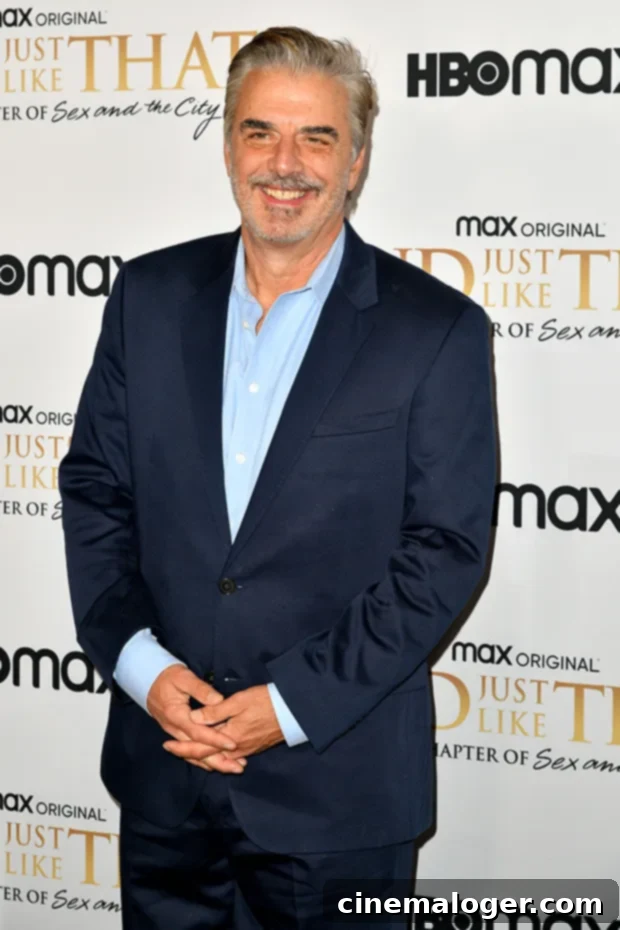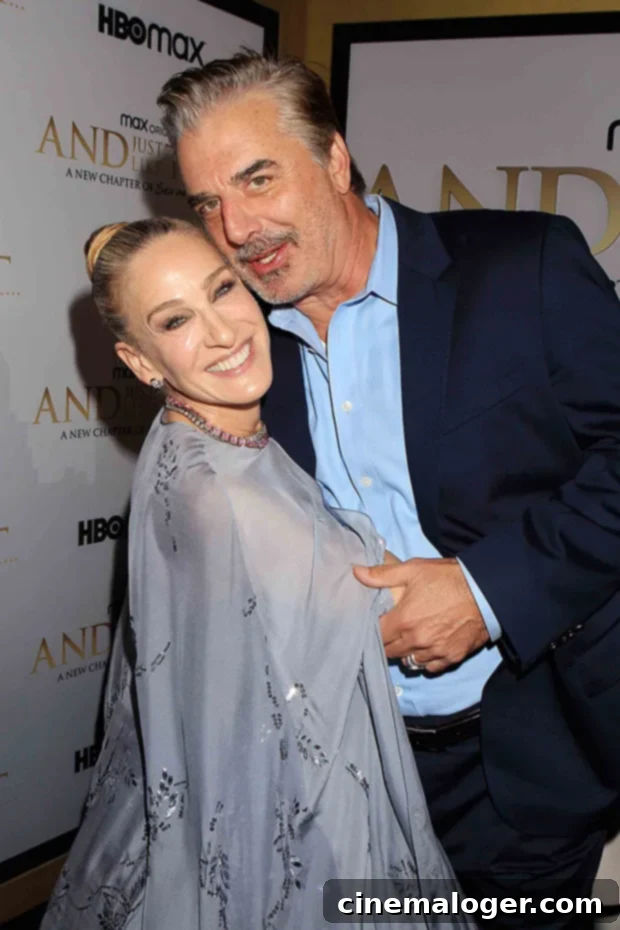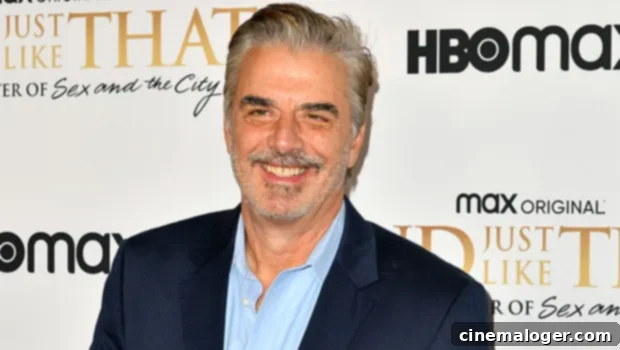Chris Noth’s ‘And Just Like That…’ Finale Cameo Scrapped Amidst Sexual Assault Allegations: Navigating Hollywood’s Evolving Accountability
The highly anticipated return to the world of Carrie Bradshaw and her friends in And Just Like That… has been hit with significant controversy, culminating in the reported removal of a key season finale cameo by actor Chris Noth. Noth, who famously portrayed Mr. Big, Carrie’s on-again, off-again love interest and eventual husband, was set to appear in a poignant fantasy sequence for the first season’s final episode. However, following multiple allegations of sexual assault against the star, show creators have reportedly decided to excise the footage, dramatically altering the planned conclusion for Sarah Jessica Parker’s character, Carrie.
The decision to cut Noth’s brief but significant appearance comes as a direct response to a series of sexual assault allegations that emerged shortly after the premiere of the HBO Max reboot. Mr. Big’s character met a tragic end early in the series, dying of a heart attack, leaving Carrie to navigate widowhood and single life in her 50s. The planned cameo was intended to offer fans a moment of closure or perhaps a bittersweet reunion for Carrie and Big in a dreamlike setting in Paris, a city synonymous with the iconic franchise. This would have been a powerful emotional beat for the series, but the off-screen developments necessitated a stark re-evaluation of its artistic integrity and public reception.

The Planned Cameo and Its Narrative Significance
According to reports from TVLine and other outlets, Chris Noth had filmed a short appearance for the And Just Like That… season finale, scheduled to air in early February. The scene envisioned a fantasy sequence where Carrie Bradshaw, portrayed by Sarah Jessica Parker, would have a reunion with her deceased husband, Big, in the romantic backdrop of Paris. This scene was crafted to provide an emotional anchor for Carrie’s journey of grief and remembrance, potentially offering her a sense of peace or a farewell that felt more complete than Big’s sudden demise in the series premiere. Given the character’s long and complex history with Carrie, stretching back decades across the original Sex and the City series and films, such a reunion, even a fantastical one, carried immense weight for the narrative and the dedicated fanbase.
The footage, reportedly shot on location in Paris, was initially conceived as a pivotal moment for Carrie, signaling her slow but steady progress in processing loss. However, the creative team behind the HBO Max series reportedly made the difficult decision to cut the footage entirely. This move suggests that the showrunners felt the narrative could still adequately wrap up Carrie’s storyline for the season without Noth’s presence, and more importantly, that including him would detract from the show’s message and potentially alienate viewers in light of the serious allegations. The decision underscores the complex balance between artistic vision and the ethical responsibilities that production companies face when controversies involving their talent emerge.
The Genesis of the Allegations and Their Immediate Aftermath
The allegations against Chris Noth first came to light through a detailed report published by The Hollywood Reporter. This report, published in December 2021, presented the accounts of two women, identified by pseudonyms Zoe, now 40, and Lily, now 31, to protect their privacy. The women, who did not know each other and made their allegations independently, claimed that their respective alleged incidents with Noth took place years apart – Zoe’s in Los Angeles in 2004 and Lily’s in New York in 2015. The timing of their decision to come forward was reportedly triggered by Noth’s renewed presence in the public eye due to the premiere of And Just Like That…, which, according to THR, “stirred painful memories.” Chris Noth has vehemently denied these allegations, stating that the encounters were consensual.
One of the women, Zoe, elaborated on her experience, alleging that the incident occurred in 2004 when she was working an entry-level job in Los Angeles. She claimed that Noth engaged in flirtatious behavior, later obtaining her work phone number and leaving messages. Zoe alleged that Noth invited her to his West Hollywood apartment, where an initial consensual kiss escalated. She detailed that Chris Noth allegedly “pulled her toward him, moved her toward the bed, pulled off her shorts and bikini bottom and began to rape her from behind.” Zoe insists she repeatedly told him to “stop,” but claims he continued. These harrowing details, though denied by Noth, painted a disturbing picture that rapidly gained traction across news outlets and social media, profoundly impacting his public image and professional standing.

Wider Repercussions: The Equalizer and Beyond
The fallout from the allegations extended beyond And Just Like That…. Chris Noth was swiftly fired from his role as a series regular on the CBS drama The Equalizer, where he played William Bishop opposite star Queen Latifah. A joint statement issued by Universal Television and CBS to HollywoodLife confirmed this, stating, “Chris Noth will no longer film additional episodes of The Equalizer, effective immediately.” At the time of the announcement, the show was on hiatus after airing seven episodes of its second season. It was also indicated that Noth would appear in only one more original upcoming episode, already filmed prior to his termination.
This swift action from a major network highlighted the entertainment industry’s increasingly zero-tolerance stance on such allegations, particularly in the post-#MeToo era. Beyond his acting roles, Noth also faced immediate consequences regarding his various endorsements and brand partnerships. His talent agency, A3 Artists Agency, dropped him, and Peloton famously pulled an advertisement featuring the actor that had cleverly played on his *And Just Like That…* storyline. These professional severances underscore the significant financial and reputational damage that can result from such accusations, irrespective of legal outcomes.
The Industry Responds: Co-stars and Public Reaction
Perhaps one of the most impactful responses came from Chris Noth’s long-time co-stars from Sex and the City and And Just Like That…. Sarah Jessica Parker, Cynthia Nixon, and Kristin Davis, who portray Carrie, Miranda, and Charlotte respectively, issued a joint statement acknowledging the gravity of the situation. Their statement read: “We are deeply saddened to hear the allegations against Chris Noth. We support the women who have come forward and shared their painful experiences. We know it must be a very difficult thing to do and we commend them for it.” This unified front from the leading ladies sent a powerful message of solidarity with the alleged victims and signaled a clear separation from their former colleague, emphasizing the industry’s evolving moral compass.
The public reaction was immediate and largely supportive of the women who came forward. Social media platforms buzzed with discussions about accountability, consent, and the responsibility of celebrities. Many fans expressed their shock and disappointment, grappling with the dissonance between the beloved character of Mr. Big and the disturbing allegations against the actor who portrayed him. This widespread public scrutiny and condemnation further pressured production companies and networks to take decisive action, illustrating the significant influence of public opinion in shaping careers and creative decisions in modern Hollywood.
Navigating Narrative and Ethics in Hollywood
The decision by the creative team of And Just Like That… to cut Noth’s cameo was not merely a reaction to controversy; it was a complex ethical and narrative choice. Including the scene, regardless of its artistic merit, would have inevitably cast a shadow over the show, making it difficult for viewers to immerse themselves in Carrie’s emotional journey without the weight of the allegations looming. The show, which aims to explore the realities of women in their 50s, would have risked undermining its own themes of empowerment and resilience by featuring an actor facing such serious accusations. This move highlights a growing trend in Hollywood where the personal conduct of actors can directly impact the viability and reception of their projects.
This incident sets a precedent for how shows and studios navigate similar situations, forcing them to weigh the original artistic vision against public perception and ethical responsibilities. It reflects a broader shift in the entertainment industry, where the #MeToo movement has fostered an environment of greater accountability and a lower tolerance for misconduct. The creative choice to remove Noth’s scene demonstrates a commitment to prioritizing the audience’s experience and the show’s integrity over contractual obligations or previously filmed content, emphasizing that no individual, however iconic, is bigger than the show or its underlying values.
The Enduring Legacy and Future Implications
The Chris Noth controversy and the subsequent decisions by production companies will undoubtedly leave a lasting mark on his career and serve as a significant case study within Hollywood. For And Just Like That…, the removal of the cameo will reshape Carrie’s season finale narrative, pushing her character to find closure and move forward without a literal or metaphorical glance back at Big. This might, in fact, empower her storyline further, forcing her to confront grief on her own terms rather than through a fantastical reunion.
Looking ahead, this situation reinforces the industry’s evolving standards of conduct and accountability. It underscores that allegations, even when denied, can have immediate and severe professional repercussions, impacting roles, endorsements, and public image. The entertainment landscape is continually adapting to public expectations and ethical demands, ensuring that both talent and content creators are held to a higher standard. The Chris Noth incident is a poignant reminder that in today’s media-saturated world, the line between an actor’s personal life and their professional persona has become increasingly blurred, with profound implications for all involved.
